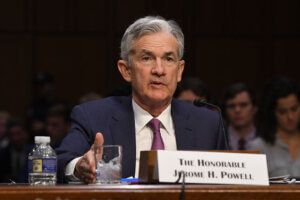
When rates rise, it amounts to an additional tax on households and companies. The extra costs deter spending for both consumers and corporations. As companies feel the effects of higher borrowing costs, they tighten their belts, cut costs and lay off workers. This is an intended consequence of Powell’s anti-inflation quest.
The Fear Over Job Losses And A Recession
The Fed’s interest rate hikes discourage spending and investments. This leads to a slowdown in the economy, potentially increasing the chances of a recession. Senator Elizabeth Warren (D-Mass.) admonished Powell, asserting that about 2 million Americans would lose their jobs if the Fed attained its goal of raising the unemployment rate by one percentage point. Warren criticized Powell’s policy of cooling down the economy to divert the public’s attention on the magnitude of job losses required to meet the Fed’s 2% inflation target.
How The Banking Crisis Started
The current banking crisis started with a run on Silicon Valley Bank and Signature Bank. Forbes reported in early March that fallout from troubled SVB could adversely impact the job market, particularly in the venture capital, startup and cryptocurrency sectors where SVB was a prominent lender and banker. With the ongoing white-collar recession, this fear will likely cause companies to hold off on hiring and continue laying off workers to cut costs, just in case things worsen.
First Republic Bank—a high-net-worth wealth management firm headquartered in San Francisco with 93 offices in 11 states—was impacted by the new economic reality. The high-end bank required a rescue by Jamie Dimon’s JPMorgan. Credit Suisse, the ailing Swiss-based investment bank, received an offer from its intracountry rival, Union Bank of Switzerland (UBS), for around $1 billion. Swiss regulators spearheaded the deal to help restore trust and calm in a highly volatile global banking environment.
UBS could cut about 36,000 jobs after the Credit Suisse merger due to the overlapping nature of the two banks. There will likely be more downsizing and hiring freezes in the banking sector.
The Fed’s Blindspot
It seems that Powell didn’t foresee the damages that his policies would create for the banking system. From the time of the financial crisis up until recently, interest rates and inflation were at historic lows. Banks prudently purchased long-duration bonds yielding around 1% to 2%.
Since the banks offered customers less than 1% interest on their savings, they could profit. Once rates started rising and people could purchase money market funds, certificates of deposit and treasury bills at around 4% or higher, the banks’ business model was thrown out of kilter.
In addition to the financial stress, regional banks are also contending with what will happen to the loans made to commercial real estate organizations, Reuters reports. With the ascension of remote and hybrid work styles, office buildings are not the hubs they used to be before the pandemic. The oversupply of office space could place further financial strains on banks, as landlords are hurting due to the lack of tenants and a drop in occupancy rates. The share prices of several banks plunged as fears spread. PacWest, Western Alliance, Zions Bancorporation and other small and regional banks saw their market capitalization plummet.
What This Means For Households
Since the rate hikes in March 2022, there has been a significant increase in consumer borrowing costs. According to the Federal Reserve, the average credit card interest rates jumped to around 21% from 16%. Data from Freddie Mac shows that the average 30-year fixed-rate mortgage increased from 3.76% to 6.43%. The cost of automobile financing increased from 3.98% to 6.58% in April 2023, and personal loans rose from 10.30% to 10.82%, per Bankrate.
With higher interest rates on mortgages, loans and credit cards, people will have less discretionary money to spend. The overall slowdown caused by higher rates will impact companies across the board. They’ll enact hiring freezes, attrition without replacement and layoffs.
In light of the news, it seems clear that jobs will be at risk, especially within the banking sector. The embattled banks will need to cut costs, and as we’ve seen in the tech sector, companies are quick to jettison workers to save money.
The End Is In Sight
According to the New York Times, Powell may pause rate hikes after his recent announcement. Despite the dire straits of regional and small banks, Powell said he would continue fighting against inflation, as it is a high priority. He acknowledged that he’d follow the data and adjust future decisions accordingly. This could mean continuing to raise rates or cutting rates if things improve.
Source: Forbes


